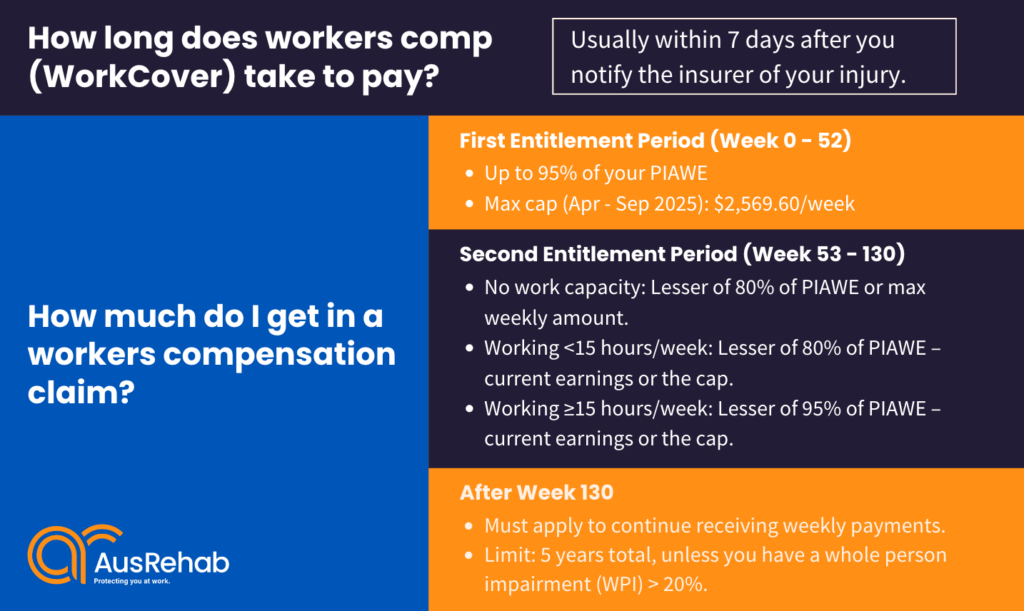May 08, 2025 • 9 min read
Workers Compensation Benefits Guide: The 2025 NSW Payout Breakdown
How much is a workers compensation payout in NSW? Explore our latest guide to learn workers comp benefits you’re entitled to, how much you get, and for how long.

Written by: Ginny Cai
Injured at work = extra financial burden? Not exactly. Workers compensation has got your back – it is meant to reduce the financial stress from a workplace injury. This way, you don’t have to worry about losing income from fewer work hours.
This comprehensive workers compensation payout guide outlines the types of benefits you’re entitled to, how much you can receive, and how long you may be eligible for workers compensation payments.
Understanding the Workers Comp Payouts Structure
To claim the benefits you deserve, it’s important to understand how workers compensation payouts are structured. In NSW, the type and amount of compensation you receive will depend on the nature of your injury and your individual circumstances. The main types of payouts include:
- Weekly payments – To compensate for lost earnings during your recovery. These are based on your Pre-Injury Average Weekly Earnings (PIAWE), including overtime and non-monetary benefits.
- Medical, hospital and rehabilitation expenses – Covers reasonable costs for medical and related treatment, ambulance treatment, workplace rehabilitation, damage to artificial aids/clothing, and travel to appointments.
- Permanent impairment payout – A lump sum available if you have a physical impairment over 10%, or a primary psychological injury over 15%.
- Work injury damages payout – A lump sum claim available when your injury resulted from someone else’s negligence, and only if you have a permanent impairment of at least 15%.
Weekly Compensation Payments Explained: How Much Can I Get?
In a workers compensation claim, the most common and frequent benefit you’ll receive is the weekly payment (taxable), which typically begins within 7 days of notifying your injury as provisional payments. The amount you receive will depend on the nature of your injury, your work capacity, and how much time has passed since the injury occurred.
First Entitlement Period (Weeks 0-52)
You may receive up to 95% of your PIAWE, whether or not you have work capacity. If you do have some capacity to work, you’ll receive the lesser of 95% of your PIAWE, or the maximum weekly compensation amount ($2,604.70 as of 31 Mar 2026), minus any current weekly earnings.
Second Entitlement Period (Weeks 53 to 130)
Depending on your work capacity, your weekly workers comp payout amount varies:
- No work capacity: The Lesser of 80% of PIAWE or the maximum weekly amount.
- Working less than 15 hours per week: The Lesser of 80% of PIAWE minus your current earnings, or the cap minus current earnings.
- Working 15 hours or more per week: The Lesser of 95% of PIAWE, or the maximum amount minus current earnings.

Over 130 weeks
If you still need ongoing support after 130 weeks, you must submit a written application to your insurer. You may continue receiving payments — up to the lesser of 80% PIAWE or the maximum weekly amount — for a total of five years.
If your permanent impairment is over 20%, you may continue receiving weekly payments until you reach the Commonwealth pension age.
Note that as you get better and start gaining some capacity to work, the amount of your weekly payment might be reduced. There are also a couple of reasons why your benefits may be suspended.
If your permanent impairment is over 20%, you may continue receiving weekly payments until you reach the Commonwealth pension age.
Note that as you get better and start gaining some capacity to work, the amount of your weekly payment might be reduced. There are also a couple of reasons why your benefits may be suspended.
Lump Sum Workers Compensation Payouts in NSW
Permanent Impairment Lump Sum Eligibility
The threshold for permanent impairment lump sum is either a 10% permanent physical impairment, or a 15% psychological injury. This lump sum is provided in addition to weekly payments and reimbursement for medical expenses. The maximum lump sum for permanent impairment is $220,000, with an additional 5% available for permanent impairment of the back, if applicable.
Work Injury Damages (WID)
Work injury damages (WID) refer to compensation for a work-related injury caused by the negligence of your employer or another party. You may be eligible to make a WID claim if you have at least 15% permanent impairment and have already received all statutory lump sum entitlements.
Once a WID settlement is finalised, you will no longer receive weekly payments or medical expenses, and any weekly benefits previously paid must be repaid from the lump sum settlement.
Legal Responsibilities You Should Conform To
To ensure you continue receiving your workers compensation benefits intact and without interruption, here are the legal obligations you must conform to:
- Notify your employer about the injury as soon as possible.
- Provide a current Certificate of Capacity every 28 days to your claims service provider.
- Participate in your Return to Work and injury recovery process.
- Cooperate with the development and execution of your injury management plan.
- Attend medical appointments and work capacity assessments arranged by your Nominated Treating Doctor (NTD).
Failure to meet these responsibilities may result in a suspension of weekly payments. Staying compliant not only protects your entitlements but also supports faster recovery and better return-to-work outcomes.
Frequently Asked Questions About Workers Comp Payouts
How long do I get workers compensation payout for?
You can usually receive weekly payments for up to 2 years, with a possible extension to 5 years through a written application.
If your permanent impairment is over 20%, you may be eligible to receive payments until pension age, subject to ongoing work capacity assessments (unless the impairment is over 30%).
Do I still get workers comp benefits if I’m at fault?
Yes — NSW operates under a no-fault workers compensation system. You’re still entitled to benefits (except WID) as long as your injury is work-related and not caused by wilful misconduct.
What is PIAWE?
PIAWE refers to your pre-injury average weekly earnings. This includes your wages, paid leave, any overtime and commissions, but the superannuation is not included.
How much is the maximum weekly payment I can receive?
As of 1 October 2025 to 31 March 2026, the maximum for workers compensation is $2,604.70 per week, subject to twice-yearly indexation on 1 April and 1 October.
Are there any exceptions for workers compensation entitlements?
Yes. Certain groups receive extended weekly payments during any period of incapacity. Specifically, if you are:
- A police officer, paramedic or fire fighter;
- Worker injured while working in or around a coal mine;
- A bush fire fighter or emergency service volunteer (Rural Fire Service, Surf Life Savers, SES volunteers); or
- A person with a dust disease claim under the Workers Compensation (Dust Diseases) Act 1942,
there are some differences in the arrangement of your weekly payouts. Refer to SIRA’s latest policies for further details.
Get Back on Track With AusRehab
Workers compensation benefits are designed to reduce the burden while you’re recovering from a work injury. But at the end of the day, it’s your health and work capacity that bring long-term stability and career progress.
Recovering and returning to work should be your top priority — and it’s ours too. At AusRehab, our team is dedicated to assisting your rehabilitation, from linking you with workers comp doctors to helping you navigate your career options. We are here to take care of every step of your recovery, so that you can worry less and focus on your recovery with zero costs.
If you’ve been injured at work, don’t hesitate to reach out.
Speak to one of our rehabilitation consultants today and let us help you get back on track.
Want to Make a Change? Share with Anyone, Anywhere.
Don’t forget to share!

Resolve your work
place injury today
